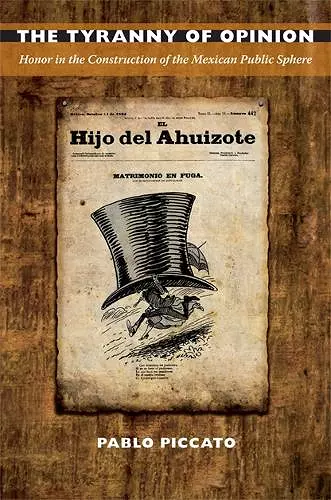The Tyranny of Opinion
Honor in the Construction of the Mexican Public Sphere
Format:Paperback
Publisher:Duke University Press
Published:11th Jan '10
Currently unavailable, and unfortunately no date known when it will be back

Study of the nineteenth century political culture of male honor among Mexican elites and within the public sphere.
A historical account of concepts of honor in Mexico during the mid-to-late nineteenth century and the role of those concepts in the development of the public sphere.In the mid-to-late nineteenth century, as Mexico emerged out of decades of civil war and foreign invasion, a modern notion of honor—of one’s reputation and self-worth—became the keystone in the construction of public culture. Mexicans gave great symbolic, social, and material value to honor. Only honorable men could speak in the name of the public. Honor earned these men, and a few women, support and credit, and gave civilian politicians a claim to authority after an era dominated by military heroism.
Tracing how notions of honor changed in nineteenth-century Mexico, Pablo Piccato examines legislation, journalism, parliamentary debates, criminal defamation cases, personal stories, urban protests, and the rise and decline of dueling in the 1890s. He highlights the centrality of notions of honor to debates over the nature of Mexican liberalism, describing how honor helped to define the boundaries between public and private life; balance competing claims of free speech, public opinion, and the protection of individual reputations; and motivate politicians, writers, and other men to enter public life. As Piccato explains, under the authoritarian rule of Porfirio Díaz, the state became more active in the protection of individual reputations. It implemented new restrictions on the press. This did not prevent people from all walks of life from defending their honor and reputations, whether in court or through violence. The Tyranny of Opinion is a major contribution to a new understanding of Mexican political history and the evolution of Mexican civil society.
“Piccato has produced a first-rate monograph of the period he previously studied, and his analysis of the press at the end of the nineteenth century, the muzzling of the press by Diaz after 1885, and the legal shift in the definition of honor and defamation is first class. The book is engaging, well researched, and well written, and is an interesting read.” - Robert Jackson, H-Net Reviews
“Piccato’s work is an important contribution to our understanding of honor in nineteenth-century Mexico and how shifting conceptions of honor were tied to class, gender, and modernity. In particular, his discussion of honor as a commodity—as something that could be produced, accumulated, and exchanged—elucidates an understanding of how honor did not serve a merely ideological function; it also served as a way to re-create and reinforce class and gender behaviors during a period when Mexico was rapidly changing.” - Nicole Sanders, Mexican Studies/Estudios Mexicanos
“The Tyranny of Opinion will likely become the definitive historical work on republican honor in Mexico and one of the most important works on republican honor and the public sphere in Latin America. With chapters on everyone from elite public men to lower-class women, the book provides exceptionally broad coverage.”—RobertM. Buffington, author of Criminal and Citizen in Modern Mexico
“This masterful exploration of the constitution of the public sphere joins questions of gender, representational practices, class, and politics in a fascinating mosaic. It is a delightful read and an illuminating work of historical ethnography, which reveals much about the difficult century between 1810 and 1910. It will help set new research agendas for modern Mexican history.”—Eric Van Young, author of The Other Rebellion: Popular Violence, Ideology, and the Mexican Struggle for Independence, 1810–1821
“Piccato has produced a first-rate monograph of the period he previously studied, and his analysis of the press at the end of the nineteenth century, the muzzling of the press by Diaz after 1885, and the legal shift in the definition of honor and defamation is first class. The book is engaging, well researched, and well written, and is an interesting read.” -- Robert Jackson * H-Net Reviews *
“Piccato’s work is an important contribution to our understanding of honor in nineteenth-century Mexico and how shifting conceptions of honor were tied to class, gender, and modernity. In particular, his discussion of honor as a commodity—as something that could be produced, accumulated, and exchanged—elucidates an understanding of how honor did not serve a merely ideological function; it also served as a way to re-create and reinforce class and gender behaviors during a period when Mexico was rapidly changing.” -- Nicole Sanders * Mexican Studies *
ISBN: 9780822346456
Dimensions: unknown
Weight: 576g
400 pages